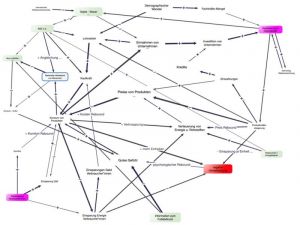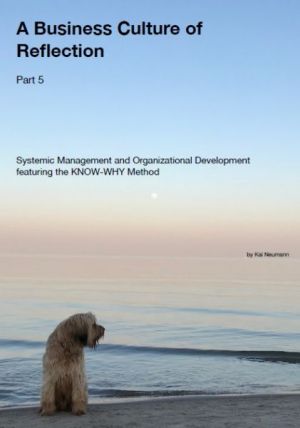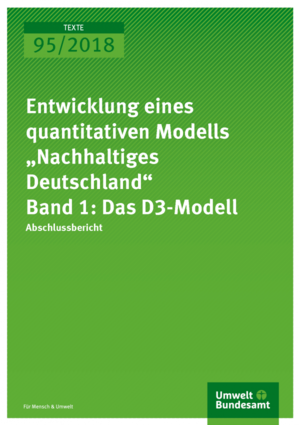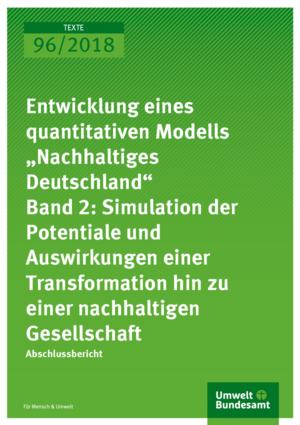Blog, News

Beergame (simulation game) is available
The beergame is a role-playing game. It simulates a four-stage supply chain (retailer, wholesaler, distributor and brewery). The beer game was developed around 1960 at the Massachusetts Institute of Technology (MIT) by the System Dynamics Group under the direction of Jay Forrester. In the meantime, the beer game has become a classic in management training.

GLU Modell
The GLU Model (Global Land Use Model) based on data from the FAO explores the potentials to feed the growing population and its change of diet. It looks at the effects on deforestation and the use of biotic resource and their implications on climate change. The model was developed with Ecologic Institute to explore the potentials for biotic resource to substitute concrete and steel. Bottom line: ceteris paribus we won’t be able to feed the world. With orchestrated changes we could even feed it from organic farming with afforestation to capture CO2.

Digi-Rebound
Just started a project with IZT and Systemic Futures to explore the potential rebounds from digitization. Like in an earlier project for the German federal environment agency the challenge is to foresee the developments of the different technologies – whether we will run into gains of efficiency to decouple growth from the need for resources and energy or whether we run into dystopia.

ULTRA-F
Consideo uses a qualitative model to explore the hygienic, technological, legal, energetic and economic aspects of the use of different ultrafiltration techniques and their potential to reduce temperatures in hot water. The aim is to save energy without the risk of legionella. Quantitative simulation models are used to explore the energy processes of an exemplary residential building and the potentials for the heat transition in Germany up to 2050.

Article: Journal of Sustainable Development of Energy, Water and Environment Systems
Material Efficiency and Global Pathways towards 100% Renewable Energy Systems – System Dynamics Findings on Potential and Constraints
Read more … Article: Journal of Sustainable Development of Energy, Water and Environment Systems

Grey Series - Part 8: The ToC and the global energy transition
After we had already investigated the global transformation towards renewable energies with the GEE(R) model (Grey Series - Part 1: Renewable Energy - It Could Be Done), we took another look at the global energy transition with the ICARE model for the Federal Environment Agency and explored the role of resources even more.
Together with Ecologic Institute, we first qualitatively investigated the nexus between climate protection and resource conservation, and then quantitatively used simulation models to look not only at the extent to which sufficient raw materials are available for the global expansion of renewable energies, but also at the effects of resource efficiency, an increased choice of photovoltaics, the import of synthetic fuels, or the substitution of greenhouse gas intensive steel and concrete with biotic raw materials.
Read more … Grey Series - Part 8: The ToC and the global energy transition

Grey Series - Part 7: Bioeconomy - the intelligent way
Our findings from the project on food security in African countries raise some general criticism of the type of research (faculty silo thinking), the design of development aid (choice of services and practices by own corporations) and the behaviour of multinational corporations (safeguarding natural resources while shifting the creation of value and simultaneously
returning inferior food products).
No doubt, the future belongs to the bio-economy, and regions with appropriate growth conditions must go their own, in many countries labour-intensive yet productive way, with the primacy of their own, stateprotected interests and emancipated from international influence. Challenging!
Read more … Grey Series - Part 7: Bioeconomy - the intelligent way

Grey Series - Part 6: Coronavirus - a systemic view
Originally intended only as a tool for use by experts, we have published on KNOW-WHY.net a System Dynamics model to reproduce the simulation curves actually discussed in the public. With each aspect of this virus we have then extended the model to discover that the event space is, or must be, potentially larger than currently discussed.
Read more … Grey Series - Part 6: Coronavirus - a systemic view

A Business Culture of Reflection
Guidance - Part 5: Systemic Management and Organizational Development featuring the KNOW-WHY Method
New Research Project
Identifying and Assessing Interactions between International Climate and Resource Policy

Youth Participation in Germany
About 2.400 pupils are designing a sustainable future by using the iMODELER

The D3 model / Publication of the Federal Environmental Agency of Germany
Research Report: Development of a quantitative model "Sustainable Germany"
Read more … The D3 model / Publication of the Federal Environmental Agency of Germany

The D3 simulation results / Publication of the Federal Environmental Agency of Germany
Research Report: The simulation of potential transitions towards sustainability and their effects. The report also covers insights on the possibilities and limitations of the simulation of social systems.
Read more … The D3 simulation results / Publication of the Federal Environmental Agency of Germany

The D3 EE model / Publication of the Federal Environmental Agency of Germany
Research Report: The report describes an additional simulation model that looks more into the details of the use of renewable energy and its implications for the use of resources as well as its economic effects
Read more … The D3 EE model / Publication of the Federal Environmental Agency of Germany





